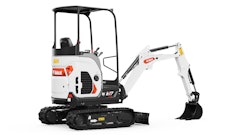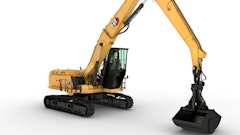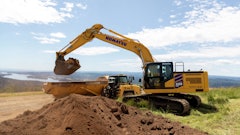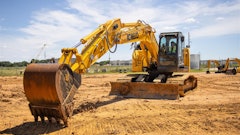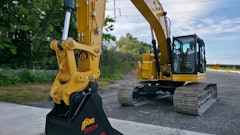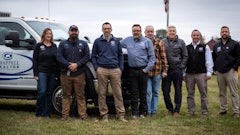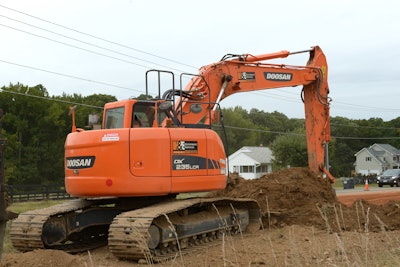
When the economy slowed down in 2008-09, renting heavy equipment was a good option for Branch Highways, a Roanoke, VA, firm that has been providing full-service heavy highway, civil and environmental construction services for more than five decades. By 2012, business had substantially increased, and to keep up with the work, the company again turned to rental.
Taking this route not only helped Branch Highways complete projects successfully and on time, it proved to be an excellent way to evaluate different types and brands of equipment.
“I think that for a company that is unsure of the direction it wants to go, rental is a good way to check out equipment before purchasing,” says Chris Caldwell, an equipment general foreman for Branch Highways. “You can evaluate how a product performs in your real work environment, how operators react and the level of service provided by the dealer. You might be surprised by what you discover.”
For Branch Highways, a number of machines were rented in 2008, including a reduced tailswing excavator, to perform a safety improvement project along an interstate highway. Four years later, with the economy on the upswing, the company rented more equipment, which led to purchasing its first Doosan products.
Excavators Prove Vital on the Interstate
Caldwell estimates the company has more than 200 pieces of heavy equipment. Having the additional machines is paying off as Branch Highways’ business is booming. The company usually has 20 to 25 projects during a typical summer throughout the Mid-Atlantic and Southeast regions. This year, that number is around 35 to 40. The number of employees has almost doubled in the past two years.
“The release of both federal and state funds for infrastructure improvements, not just roads and bridges, has really helped us keep busy,” says Caldwell, who has worked for the employee-owned company for 20 years. “Department of Transportation projects have been a staple of our business from day one. We are still doing plenty of that work and expanding into other areas as well.”
The company recently completed the installation of an additional high-occupancy toll lane on Interstate 95 in northern Virginia. The 9-mile portion of the corridor, from exit 143 to exit 151 near the Quantico Marine Base, is an exceptionally busy and congested stretch of interstate. It could not be closed, and there could not be any interference with traffic flow during construction.
“One of the machines that performed very well at this site was our Doosan DX235LCR reduced tailswing excavator,” Caldwell says. “When we were laying pipe, the excavator had to work in a very tight area, with several lanes of traffic on one side and a barrier wall on the other side. This was a safety-driven job, so the ability of the excavator to work in a restricted area was invaluable.”
Branch Highways is currently building a grade-separated, diverging diamond interchange at the U.S. 460 bypass and Southgate Drive near the entrance to Virginia Tech University in Blacksburg. The project includes widening the right and left shoulders on the bypass, adding entrance and exit ramps, relocating and widening Southgate Drive to a four-lane divided highway and building two roundabouts with bypass lanes.
A trio of Doosan crawler excavators — DX225LC-3, DX235LCR and DX350LC-3 — are on site handling a variety of jobs, including digging, loading trucks, moving materials and land clearing.
“We are not a land clearing contractor,” Caldwell says. “However, the DX225LC-3 equipped with a hydraulic clamp has been removing brush from the jobsite. It is such a versatile machine that when it is done clearing the property, it goes right to work laying pipe and handling erosion control and drainage projects.”
Twenty years ago, the state of Virginia passed the Public-Private Transportation Act (PPTA) that allows private entities to propose innovative solutions for designing, constructing, financing and operating transportation improvements. Firms such as Branch Highways negotiate a price for a design-build highway project and assume the risk associated with the job.
“We got into this niche market early,” says Caldwell, “and, as a result, some of the largest projects in our company’s history have been PPTA jobs.”
One of those projects is the 36-mile Route 58 improvement job. The company is widening the road from Hillsville to Stuart, including a four-lane divided highway bypass, new interchanges and eight new bridges.
Among the benefits cited by the state of this PPTA job: less chance for potential cost overruns because each phase is performed at a fixed-price, fixed-completion date; defined performance standards and extended warranties that will produce higher-quality, lower-maintenance construction; and a completion date much sooner than using traditional processes.
Suited to Moving Material in a Variety of Locations
As utility companies add more transmission towers to meet the demand for electricity, Branch Highways has found a new opportunity. The company is building concrete pads for providers such as American Electric Power. In situations where the location is confined, the DX235LCR excavator is used. “That machine fits this application perfectly,” Caldwell says.
The ability of the reduced tailswing excavator to work in close quarters also proved to be very valuable when Branch Highways was contracted to handle a series of projects at Liberty University in Lynchburg, VA. “Some of the jobs were right in the middle of the campus, so safety was paramount,” Caldwell says.
It was at Liberty University where the company first used the DX350LC-3 excavator and a wheel loader. With multiple jobs going on at the same time, equipment versatility took on a whole new meaning.
“One day the DX350LC-3 was used to load dirt into trucks as we built ball fields. The next day it was doing sediment ponds, laying pipe, setting barriers,” notes Caldwell. “That’s our ‘bread and butter’ machine.”
The company’s Doosan DL200TC-3 (tool carrier) and DL250TC-3 wheel loaders are used for all of the firm’s storm drain jobs. Caldwell says the machines with pallet fork attachments can pick up large pipe and move it around efficiently.
“We have found that a wheel loader is one of the most important pieces of equipment you can have on a road project,” Caldwell says. “That is because it can do a number of different jobs at the same site. Among other things, we use our wheel loaders to constantly supply stone and pipe so projects keep moving forward. A load of pipe will usually be dropped in one location and if the job, for example, is 5 miles long, you need a good, reliable machine to handle the material.”
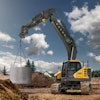


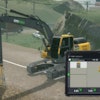
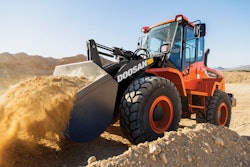
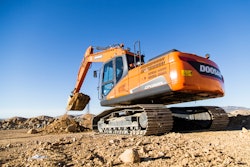
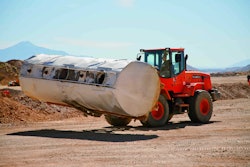


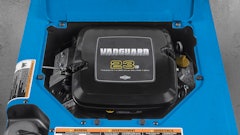

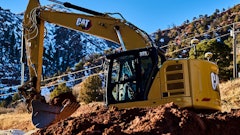
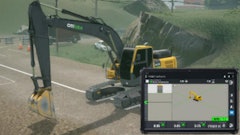
![Hcm Ax Landcros Dual Branded Logo[25]](https://img.forconstructionpros.com/mindful/acbm/workspaces/default/uploads/2025/11/hcmaxlandcros-dual-branded-logo25.Qhg3vUCjoK.jpg?ar=16%3A9&auto=format%2Ccompress&bg=fff&fill-color=fff&fit=fill&h=135&q=70&w=240)
